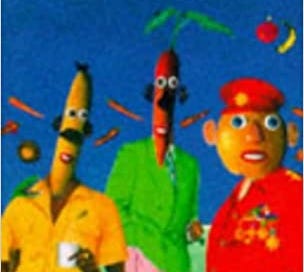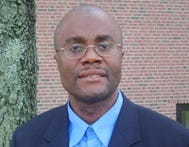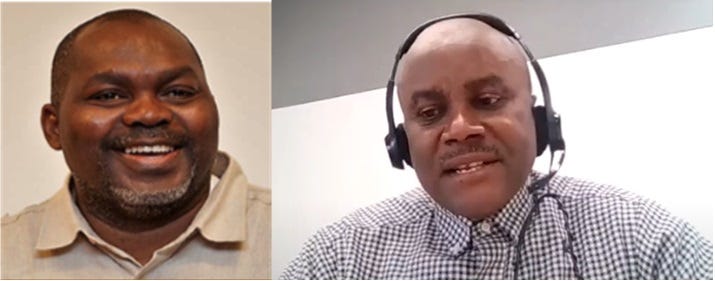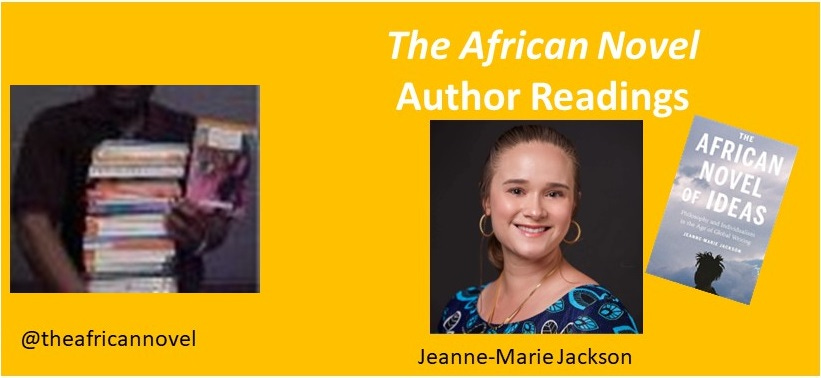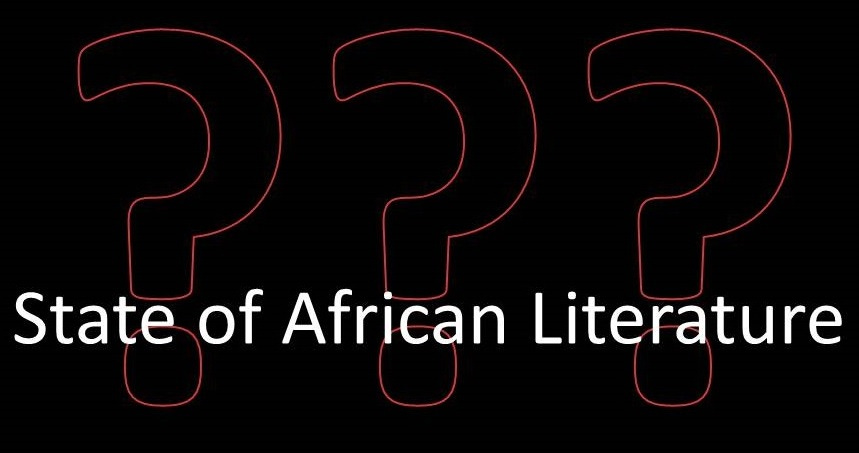Welcome to the latest issue of The African Novel digital newsletter. You have joined an exciting global community of publishers, authors, readers, writers, poets, and performers, as well as academics, missionaries, and even current and former Peace Corps volunteers. We are all connected in our passion for appreciating, celebrating, and sharing African literature and performance in its many forms.
To savor this e-newsletter, we’d highly recommend you patiently read from top to bottom!
Thanks for reading The African Novel! Subscribe for free to receive new posts.
IN THIS ISSUE
Editor-in-Chief's Message
Book Review: Major Gentl and the Achimota Wars
The African Novel Podcast: Obiwu
Author Readings: Jeanne-Marie Jackson
State of African Literature
Bookshelf
Book Events & More
Our Radio Archives
African Proverb: Maasai
Editor-in-Chief’s Message
When we set out on a mission to publish this monthly newsletter back in April, we knew that The African Novel Podcast would be the anchor of all other content this publication would offer. We, as a team, are passionate about audio journalism, so producing podcasts on a subject we feel passionate about would be a piece of cake. It truly is.
Eight issues later, we are heartened by the growing number of outlets where The African Novel Podcast can be heard, shining the spotlight on our storytellers — emerging and veteran alike — narrators of our many and varied stories as people of African descent across the world.
A case in point. After being featured on the podcast in the October issue, Harlem-based writer Obi Nwizu now shows up very impressively on a number of places — “wherever you get your podcast” — Google podcast, Amazon Music, Audible, Deezer, Player FM, Podcast Addict, Podvine Spotify, to name just a few. Google “writer Obi Nwizu” on your own and see for yourself.
We produce, and you, our devoted readers and subscribers, continue to help us spread the word about the newsletter and its niche contents: podcast interviews and more. We are at work to inform, entertain and educate you month after month. Happy reading and stay tuned!
Enjoy!
Cyril Ibe, Ph.D
P.S. Perhaps a friend forwarded this email to you. Sign up now to receive The African Novel directly in your inbox.
Please share the enjoyment of reading The African Novel digital newsletter with a friend, family member, or colleague.
Book Review
Title: Major Gentl and Achimota Wars
Author: Kojo Laing
Publisher: Heinemann African Writers Series
Reviewer: Benjamin Kwakye
Kojo Laing’s inventive novel, Major Gentl and the Achimota Wars, stands out in its attempt to create a unique form of literature. Laing does this by mixing a range of literary forms to create something remarkable.
Major Gentl and the Achimota Wars is set in Achimota city (presumably in Ghana) in the year 2020. Life, as we know it, is completely different as Major Gentle, confronts Torro the Terrible in the Wars of Existence. Laing stretches realism until it becomes magical. Here’s a future when armies comprise of animals, when the living die in one chapter only to be resurrected in another, and when flora and fauna seem to have little distinction.
For a long time, it is not clear who would win the raging Wars of Existence. Would it be the gentle Major Gentl or the fearsome Terror the Terrible, a man born simultaneously in Europe and Africa? In the battles they fight, these characters seem to question the extent we ought to accept, challenge or control one another’s humanity. Perhaps the novel’s greatest achievement is Laing’s remarkable use of language. He almost seamlessly weaves local Ghanaian slang and languages into traditional English to create a unique piece of literature. While Major Gentl and the Achimota Wars presents no linear plot as such, it stands out for its boldness, uniqueness, and humor.
Kojo Laing was born in Kumasi, Ghana. He is the author of Search Sweet Country, Woman of the Aeroplanes, and Godhorse.
Editor’s Note: Reviewer Benjamin Kwakye is The African Novel’s “Resident Novelist.
Episode #8
Poet/writer Obiwu talks with Cyril Ibe about his new collection of personal essays on poets.
“I would like to get the conversation going on poets. Many people seem to be doing away with poetry. And poetry is not in our conversations, although there are many poets,” Obiwu says.
Past Podcast Episodes:
Harlem-based writer Obi Nwizu, author of Residue
Jeanne-Marie Jackson, author of The African Novel of Ideas
Patricia Jabbeh Wesley, author of Praise Song for My Children
Bayadir Mohamed-Osman, author of Second Hand Smoke
Vanessa Onwuemezi, author of Dark Neighbourhood
Cyprian Njoku Josson, author of The Immigrant Ladder
Kabuika Kamunga, author of Kabuika Wants to Make New Friends
Author Readings
Hear authors themselves reading from their works.
Professor Jeanne-Marie Jackson reads from The African Novel of Ideas: Philosophy and Individualism in the Age of Global Writing.
Questions on the State of African Literature
Three questions are posed to writers every month. Listen here to their answers.
Responding to the questions is Nigerian-born professor of English, Obi Iwuanyanwu (Obiwu)
Are writers of African fiction “taking the literary world by storm?” these days?
Is the “tide turning” for African literature in America and the rest of the West?
Are we witnessing “a renaissance” of African literature in our world today?
Bookshelf
What writers and readers of African titles are reading:
Comparative literature professor Jeanne-Marie Jackson (Baltimore, Maryland): Brotherhood by Mohamed Mbougar Sarr (in English translation; French original); The Wolf at Number 4 by Ayo Tamakloe-Garr; The Madhouse by T.J. Benson; and An Unusual Grief by Yewande Omotoso (just started reading).
Poet Obiwu (Ohio, USA): The Girl with the Louding Voice by Abi Dare; Ijele by Uche Nduka; Samarkand by Wole Soyinka; Ingrid Joker: Poet Under Apartheid by Louise Viljoen.
Writer Arinze Ifeakandu: Hue and Cry by James Alan McPherson, and The Great Mistake by Jonathan Lee.
Writer Obi Nwizu (New York): Another Country by James Baldwin and The Girl With the Louding Voice by Abi Dare.
Poet Bayadir Mohamed-Osman (Maryland): Pathologies of Power: Health, Human Rights, and The New War on the Poor by Dr. Paul Farmer; Secrets of Divine Love by A. Helwa.
Writer/Poet Vanessa Onwuemezi (London): The Palmwine Drinkard by Amos Tutola; Lote by Shola Von Reinhold.
Novelist Cyprian Josson (Chartres, France): Ladies Trip by Fanny Enoh; Burning Grass by Cyprian Ekwensi.
Novelist Benjamin Kwakye (Michigan, USA): Chronicles from the Land of the Happiest People on Earth by Wole Soyinka; The Love Songs of W.E.B. Du Bois by Honoree Fanonne Jeffers.
Cyril Ibe (Ohio, USA): Things Fall Apart (in French)/Le Monde s’effondre by Chinua Achebe; Songs of Benjamin by Benjamin Kwakye.
(As a reader or subscriber of this newsletter, you can submit titles of African fiction and other books on your reading list. Tell us in what part of the world you reside).
Book Events & More…
On Demand:
What: Library of Congress’ Interviews with African Writers, a three-part series titled “Conversations with African Poets and Writers Series.” Featured are Nigerian-born author Chimamanda Ngozi Adichie, South African novelist and playwright Damon Galgut, and Tanzanian-born novelist and Nobel Laureate Abdulrazak Gurnah.
When: Available since May 2022.
Where: Library of Congress
For more information: Visit here.
Our Radio Archives
Coming soon: Offerings of rare, exclusive interviews and audio documentaries for our paid subscribers.
A partial list of archived Premium offerings:
Interview: Chinua Achebe biographer Ezenwa-Ohaeto
Interview: Nobel Laureate Wole Soyinka on his legendary cousin, Fela
Interview: The Black press in America
Interview: South African novelist Mark Mathabani
Audio Documentary: Eighty Gifts for Poet Laureate Gwendolyn Brooks
An audio tour of the Mandela House Museum in Soweto, South Africa
Interview: Ethiopian-Jewish Filmmaker Orly Malessa
Interview: U.S. filmmaker Ileen LeBlanc on Take Us Home, a documentary pic on the exodus of Ethiopian Jews to Israel.
Interview: American historian Edward Haas on slavery, the civil war, and the uncelebrated heroism of Blacks in the Union Army.
Interview: Herbert Martin, professor emeritus of English literature and African-American studies at the University of Dayton and co-editor of The Collected Novels of Paul Laurence Dunbar (Ohio University Press).
Thanks for reading The African Novel! Subscribe for free to receive new posts and support our work.
African Proverb
"If a stranger comes to stay with you, do not forget when you lay aside his weapons that he is hungry.” — Maasai Proverb
Our Team
Cyril Ibe, Ph.D., Editor-in-Chief (Ohio)
Resident Novelist/Reviewer Benjamin Kwakye (Michigan)
Nollywood Director/Filmmaker/Novelist Cyprian Josson (Chartres, France)
Contributor/Writer Kabuika Kamunga (Rochester, Minnesota)
Past Issues of The African Novel eNewsletter:
Issue #4

